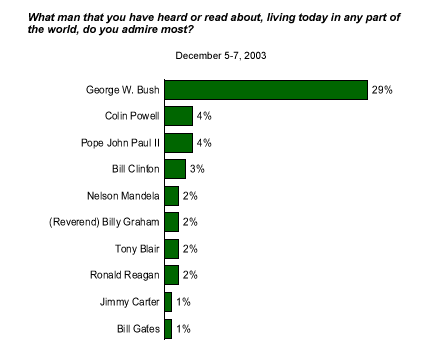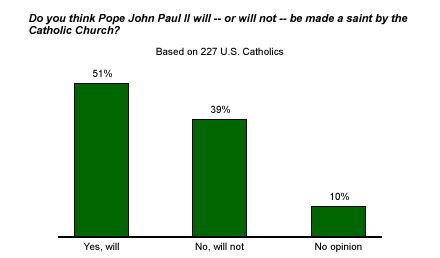Karol Wojtyla celebrates his 84th birthday Tuesday -- a significant accomplishment for any man. But Wojtyla isn't just any man, he's the pope. And it's what John Paul II has accomplished since his pontification in 1978 that has earned him many admirers, as well as critics, around the world.
John Paul II has arguably been the most visible and well-traveled pope ever. According to the Vatican, more than 17 million pilgrims (not counting the millions in special audiences, religious ceremonies, and visits in Italy and around the world) have taken part in the pope's General Audiences. He has held nearly 1,000 audiences and meetings with prime ministers and heads of state (George W. Bush is scheduled to meet with the pope next month). Given the pope's visibility, his outspokenness on world issues, and his leadership of the world's 1 billion Catholics, it's not surprising that The ���۴�ýPoll has been tracking opinions about him for the last 26 years.
Most Admired
The pope has millions of admirers around the world. In the United States, he has appeared 26 times among the top 10 men on Gallup's most-admired list. In the 55 years that ���۴�ýhas polled Americans on the men and women they admire most, Pope John Paul II has the third most appearances on the list, after the Rev. Billy Graham and former President Ronald Reagan.

Paula Taliaferro has met the pope several times since first meeting him as a teenager in 1979. "I had this impression that when he looked at me, he looked straight through me," she says. "Through all these years, with all that has gone on in the church, part of what has kept me faithful to the church is that I feel like he has a special bond with God."
Taliaferro isn't surprised that so many people admire Pope John Paul II. "Whether you agree with his policy decisions or not, it is difficult to deny the integrity of the man. You have to admire someone who would take the bold actions that he has. Even people who adamantly dislike his policies like him," she says.
Liliana Zito, who waited roughly four hours in line to see the pope in Italy nearly 20 years ago, is also not surprised. "I think people probably admire his intelligence and because he is a person who really wants peace on Earth," Zito says.
John Paul II's favorability ratings reflect the fact that he's admired by millions of Americans. From 1978 through 2003, Gallup asked Americans to rate the pope on either a favorable/unfavorable or like/dislike scale. Respondents consistently expressed favorable views of John Paul II, and said they like him very much. In October 2003, 73% of Americans had a favorable opinion of the pope, and 17% had an unfavorable opinion. Eighty-eight percent of Catholics in that same poll said they viewed the pope favorably, while 9% had unfavorable views.
Job Approval
Because John Paul II leads the Catholic Church, ���۴�ýhas occasionally examined his image specifically among Catholic respondents. For the most part, Catholics think the pope is doing a good job, but they do not always agree with him.
In 1993, and again in 2003, ���۴�ýasked Catholics if they approved or disapproved of the way John Paul II was handling his role as leader of the Catholic Church. In 1993, 72% of Catholics approved, while 12% disapproved. The percentage of those who disapproved (33%) was significantly higher in 2003, probably due to the sex abuse scandals that tarnished the image of the Catholic Church. But even that year, a majority of Catholics (63%) approved of the job the pope was doing.
However, Catholics are split on whether some of the John Paul II's teachings are infallible. In 2003, 45% of Catholics said the pope is infallible when he teaches on matters such as the divinity of Christ (50% said he's not infallible), and 39% said he is infallible when he teaches on matters such as birth control and abortion (57% disagreed). On difficult moral questions, 83% of Catholics said they would follow their own consciences rather than the pope's teachings (14% said they would follow the pope).
Resignation?
Last year, when the pope's health seemed to be rapidly deteriorating, Catholics seemed more apt to believe the pope should resign for health reasons than they had been in 2002. In 2003, Catholics were decidedly split on whether John Paul II should resign (the last pope to resign or abdicate stepped down in 1294) or remain in office until he dies. Fifty percent said he should resign for health reasons, while 49% said he should remain until his death. Over the three times the question was posed to Catholics in 2002, support for him to remain averaged about 56%.
Taliaferro says she can't imagine that he would resign as long as his mind is fine. "If he starts to get confused, I wonder if he would take himself out of the position," she says. "From all indications, it doesn't seem like he's confused at all."
Sainthood?
Do Catholics think the Catholic Church will make John Paul II a saint? In December 2003, a slim majority (51%) said the church will make him a saint, and 39% said it would not. Zito is among the majority of Catholics who think this will happen. "I have a strong feeling [it will]," she says. "He's like a saint today."

